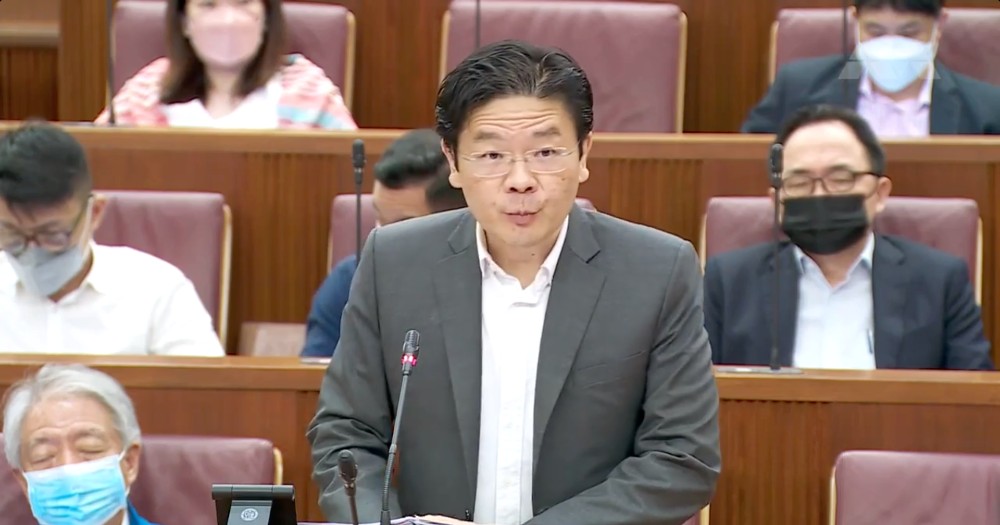Follow us on Telegram for the latest updates: https://t.me/mothershipsg
Deputy Prime Minister and Minister of Finance Lawrence Wong spoke about Singapore staying competitive and helping businesses and workers during his Budget 2023 roundup speech on Feb. 24.
Grow the pie to share the pie
Wong rejected the notion raised by some members of the business community, that the government had shifted to a pro-redistribution model at the cost of being pro-growth.
He said that growth was the only way to ensure that there would be enough resources to redistribute, strengthen the social compact, and progress as a people, and the government remained "focused on growing the economic pie".
Growth, however, would be more challenging in the future due to increased global competition and geopolitical tensions.
Fortunately, Singapore is moving into this new era from a strong position, seeing a healthy inflow of investment, capital, and talent.
Carpe diem
It would need to seize such opportunities to build capability, strengthen its value proposition, and create more jobs and opportunities for Singaporeans. This would be while managing the permanent and inherent constraints in manpower, land, and energy.
Singapore could not compete on the basis of cost alone, and Wong gave the example of Singapore's port, which was not the cheapest in the world.
But it took advantage of its good connectivity, infrastructure, range of services, as well as its efficiency and reliability to differentiate itself.
Investment and partnerships
Wong then gave the example of Singapore's MedTech sector, where multinational enterprises (MNEs) and local SMEs had partnered.
MNEs brought cutting edge capabilities, and enabled local SMEs to improve their capabilities and scale up their businesses to reach more customers.
The government was committing significant resources to help local enterprises grow, doubling grants amounts between 2019 and 2022.
It was also helping SMEs to tackle rising business costs, for example it was taking on up to 75 per cent of the cost of wage increases under the Progressive Wage Credit scheme.
But the government's main thrust of support would be to help SMEs raise their productivity, especially those who were prepared to restructure their businesses and venture into new markets and products.
Transformation
The government was taking a sector by sector approach to helping businesses restructure and transform, as each sector had unique needs and starting points.
Some, such as manufacturing and financial services, which were more outward looking, had achieve strong productivity growth and job creation. But more domestic bound sectors like FnB and construction faced more challenges.
However, Wong said the shift towards less manpower intensive methods such as central kitchens and prefabricated buildings was an encouraging sign of sectors raising productivity and reducing reliance on manpower.
Still, there was a need to go further.
Economic churn
Economic transformation would, Wong said, inevitably lead to a certain amount of economic "churn".
This churn, while healthy for the economy, would displace workers, and result in them needing to rescale and upskill. That is the focus of SkillsFuture movement.
Wong said that the government had brought about a major mindset and paradigm shift, with universities and polytechnics firmly embedded in the continuing education and training space.
Companies were also working with NTUC and training committees and unions to come together and focus on job redesign and training.
The next stage was a three sector pilot program for Job Skills Integrators, mentioned in his Budget statement, which would act as a coordinator for stakeholders in a particular sector.
While such a role had been done on an informal ad hoc basis before, the government would provide resources for a formalised role with clear outcome indicators to achieve better quality training and jobs matches.
Avoid negative outcomes
The ultimate goal was to help Singaporeans navigate the various stages of their careers and help those who experience a career setback to bounce back.
This was especially true for mature workers, who upon losing a job, were faced with financial and family obligations that might encourage them to take the first available replacement job, without considering if it was a good fit.
While it was important to support these workers, Wong said the government wanted to ensure any support given did not erode the incentive to work, citing examples where workers with generous benefits prefered to stay unemployed than to return to the workforce.
Instead the government was considering targeted reemployment support, which would provide a "cushion" while workers undertake training to upgrade their skills, finding new roles that fit their abilities and aptitudes.
Doing this would mean that workers would find their work more meaningful, with meant higher job satisfaction, fulfilment, and ultimately productivity.
Singapore's model, including that of tripartism, was not about being pro-business or pro-worker, or even growth vs redistribution. It was about employers, unions, and the government coming together "to advance the well being of Singaporeans."
Related stories
Top image via MCI/YouTube
If you like what you read, follow us on Facebook, Instagram, Twitter and Telegram to get the latest updates.
